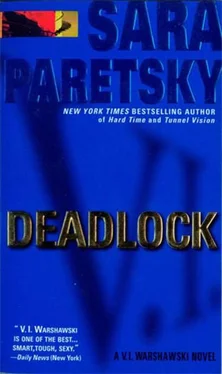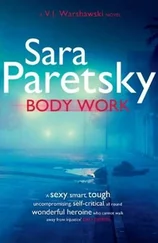My dad had been a sergeant, working mostly out of the Twenty-First District on the South Side. The brick building on 12th Street brought on a twinge of nostalgia-it had the same linoleum, the same cinder-block walls with yellow paint peeling away. A few harassed, overweight men behind the desk were processing everyone from drivers putting up bond for their licenses to women trying to see men brought in on assault charges. I waited my turn in line.
The desk officer I finally spoke to called inside on a microphone. “Sergeant McGonnigal, lady here to see you on the Kelvin case.”
McGonnigal came out a few minutes later, big, muscular, wearing a rumpled white shirt and brown slacks. We’d met a couple of years back when he was on the South Side and he remembered me immediately.
“Miss Warshawski. Nice to see you.” He ushered me back through the linoleum corridors to a tiny room he shared with three other men.
“Nice to see you, Sergeant. When were you transferred downtown?”
“Six, seven months ago. I got assigned to the Kelvin case last night.”
I explained that the murder had taken place in my cousin’s apartment and that I wanted to know when I could get back in and straighten out his papers. McGonnigal expressed the usual regrets at Boom Boom’s death-he’d been a fan, et cetera, and said they were almost finished with the apartment.
“Did you turn up anything? I understand the TV films showed two men going in. Any fingerprints?”
He grimaced. “They were too smart for that. We did find a footprint on the papers. One of them wears size twelve Arroyo hiking boots. But that doesn’t tell us much.”
“What killed Kelvin? He wasn’t shot, was he?”
He shook his head. “Someone gave him an almighty hard blow to the jaw and broke his neck. May only have meant to knock him out. Jesus! What a fist. Doesn’t tie in to any of our known B & E men.”
“You think this is a straight break and entry job?”
“What else would it be, Miss Warshawski?”
“Nothing of value was taken. Boom Boom had a stereo, some fancy cuff links and stuff, and it was all there.”
“Well, figure the guys are surprised by Kelvin. Then they see they’ve killed him rather than just stunning him like they intended. So they get nervous and leave. They don’t know whether someone else is going to come up looking for the guy if he doesn’t come back in so many minutes.”
I could see his point. Maybe I was making a mountain out of a molehill. Maybe I was upset by my cousin’s death and I wanted to blow it up into something bigger than an accident.
“You’re not trying to get involved in this, are you?”
“I am involved, Sergeant: it happened in my cousin’s apartment.”
“The lieutenant is not going to be happy if he hears you’re trying to stir up this case. You know that.”
I knew that. The lieutenant was Bobby Mallory and he did not like me to get involved in police work, especially murder cases.
I smiled. “If I stumble across anything looking through my cousin’s affairs, I don’t think that’ll upset him too much.”
“Just give us a chance to do our jobs, Miss Warshawski.”
“I spoke with the Kelvin family this afternoon. They’re not too sure you guys are really trying your hardest.”
He slammed his palm on his desk top. The three other men in the room tried to pretend they were still working. “Now why the hell did you go talk to them? One of the sons came around here and gave me a snootful. We’re doing out best. But, Christ, we haven’t got a damned thing to start from other than two pictures no one can identify and a size twelve boot!”
He pulled a file savagely from a stack on his desk and yanked a photograph from it to toss at me. I picked it up. It was a still made from the TV film of the men going into Boom Boom’s place. Two men, one in jeans and the other in chinos. They both wore corduroy sports jackets and had those Irish caps held up over their faces. McGonnigal handed me a couple of other stills. One showed them getting off the elevator-backward. Another showed them walking down the hall, crouched over to disguise their height. You could see their hands pretty clearly-they were wearing surgical gloves.
I gave the pictures back to McGonnigal. “Good luck, Sergeant. I’ll let you know if I come across anything… When can I get the keys to the place back?”
He said Friday morning and warned me to be very, very careful. The police are always telling me that.

From my apartment I tried Boom Boom’s agent again, even though it was after six. Like me, Fackley worked unusual hours. He was in and answered the phone himself. I told him I wanted to get in touch with Pierre Bouchard, star forward for the Hawks and another of his clients. Fackley told me Bouchard was in his hometown, Quebec, playing in the Coeur d’Argent, a demonstration hockey tournament. Fackley gave me his Chicago phone number and agreed to see me the following Wednesday to go through Boom Boom’s papers.
I tried phoning the Pole Star Line but no one answered. There wasn’t much else I could do tonight. I called Lotty and we went out for dinner together and then to see Chariots of Fire .
The photocopies of Eudora Grain’s shipping records were ready for me at ten the next morning. I stuck them in a large canvas shoulder bag. The originals I wrapped in heavy brown paper, taped securely. Starting to write Janet’s name on top, I realized I didn’t know her last name. Women exist in a world of first names in business. Lois, Janet, Mr. Phillips, Mr. Warshawski. That’s why I use my initials.
I reached the Port before lunch and dropped the packet off with the receptionist at Eudora Grain, then swung around to the main entrance, where Grafalk and Bledsoe had their offices. The guard at the gate gave me some static about going in without a pass but I finally convinced him I needed to talk to someone at Pole Star and he let me have a two-hour permit.
The Pole Star Line occupied only two rooms in one of the large sand-colored buildings at the far end of the pier. Although much smaller than Grafalk’s operation, their offices included the same organized chaos of computers, charts, and telephones. All were manipulated in an electronic symphony by one harassed but friendly young woman. She unplugged herself from the phone long enough to tell me that Bledsoe was at Elevator 9 with the Lucella . She sketched rough directions for me-it was back along the Calumet River several miles-and returned to a madly ringing phone.
Phillips came out of the Grafalk building as I passed it on the way to my car. He wasn’t sure whether to recognize me or not, so I solved the problem by saying hello to him.
“What are you doing here?” he demanded.
“Signing up for a water ballet class. How about you?”
He turned red again. “I assume you’re still asking questions about your cousin. More Hydra heads?”
I was surprised to find he could be whimsical. “I just want to clear all the bases-I still have to talk to the crew on the Lucella before she sails.”
“Well, I think you’ll find you’ve put a lot of energy into something not worth the effort. It’s to be hoped you find that out soon.”
“I’m moving as fast as I can. I figure water ballet can only help.” He snorted and strode over to the green Alfa. As I was climbing into the Lynx I heard him roar past, spitting a little gravel.
Elevator 9 was not one of Eudora Grain’s but belonged to the Tri-State Grain Co-op. A chain fence separated the elevator yard from the road. Train tracks ran through a gap in it and a small guardhouse with a heavy, red-faced man reading the Sun-Times stood at the entrance. The Lynx bounced along the ruts to the guardhouse, where Redface reluctantly put down his paper and asked me what I wanted.
Читать дальше













